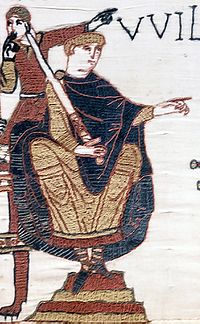
Back وليام (اسم) Arabic Уільям Byelorussian William Breton William Danish William German William Esperanto William (nombre) Spanish ویلیام Persian William Finnish William French
This article may require cleanup to meet Wikipedia's quality standards. The specific problem is: The article begins by saying the name is of French origin and later says of Proto-Germanic. The latter is the case. (February 2025) |
 William the Conqueror The name William became very popular in the English language after the Norman conquest of England in 1066 by William the Conqueror. | |
| Pronunciation | /wɪljəm/ |
|---|---|
| Gender | Male |
| Language(s) | Norman French, & Germanic languages |
| Name day | October 28 |
| Origin | |
| Meaning | "Vehement protector" |
| Region of origin | Northern Europe |
| Other names | |
| Nickname(s) | |
| Related names | |
| Popularity | see popular names |
| [1] | |
Look up William in Wiktionary, the free dictionary.
William is a masculine given name of French origin. It became very popular in the English language after the Norman conquest of England in 1066,[2] and remained so throughout the Middle Ages and into the modern era. It is sometimes abbreviated "Wm." Shortened familiar versions in English include Will, Wills, Willy, Willie, Liam, Bill, Billie, and Billy. A common Irish form is Liam. Scottish diminutives include Wull, Willie or Wullie (as in Oor Wullie or the play Douglas). Female forms are Willa, Willemina, Wilma and Wilhelmina.
- ^ William – Meaning and origin of the name William
- ^ All Things William, "Meaning & Origin of the Name"